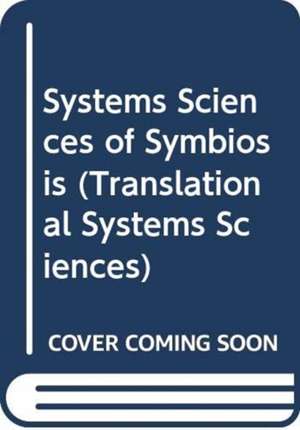Systems Sciences of Symbiosis: Translational Systems Sciences, cartea 60
Autor Kyoichi Kijimaen Limba Engleză Hardback – 12 noi 2025
Din seria Translational Systems Sciences
- 20%
 Preț: 628.88 lei
Preț: 628.88 lei - 15%
 Preț: 642.51 lei
Preț: 642.51 lei - 18%
 Preț: 948.92 lei
Preț: 948.92 lei - 18%
 Preț: 786.52 lei
Preț: 786.52 lei - 20%
 Preț: 661.65 lei
Preț: 661.65 lei - 18%
 Preț: 720.68 lei
Preț: 720.68 lei - 18%
 Preț: 782.57 lei
Preț: 782.57 lei -
 Preț: 384.09 lei
Preț: 384.09 lei - 18%
 Preț: 728.43 lei
Preț: 728.43 lei -
 Preț: 447.24 lei
Preț: 447.24 lei - 15%
 Preț: 654.30 lei
Preț: 654.30 lei - 18%
 Preț: 783.20 lei
Preț: 783.20 lei -
 Preț: 389.11 lei
Preț: 389.11 lei - 18%
 Preț: 882.82 lei
Preț: 882.82 lei - 18%
 Preț: 884.22 lei
Preț: 884.22 lei - 18%
 Preț: 728.91 lei
Preț: 728.91 lei - 18%
 Preț: 723.69 lei
Preț: 723.69 lei - 18%
 Preț: 776.09 lei
Preț: 776.09 lei - 18%
 Preț: 891.48 lei
Preț: 891.48 lei - 18%
 Preț: 1106.31 lei
Preț: 1106.31 lei - 18%
 Preț: 1106.79 lei
Preț: 1106.79 lei - 18%
 Preț: 775.30 lei
Preț: 775.30 lei -
 Preț: 385.08 lei
Preț: 385.08 lei - 15%
 Preț: 635.65 lei
Preț: 635.65 lei - 18%
 Preț: 941.68 lei
Preț: 941.68 lei - 18%
 Preț: 944.99 lei
Preț: 944.99 lei - 18%
 Preț: 1113.26 lei
Preț: 1113.26 lei - 18%
 Preț: 1114.02 lei
Preț: 1114.02 lei
Preț: 509.31 lei
Preț vechi: 736.89 lei
-31% Nou
Puncte Express: 764
Preț estimativ în valută:
97.45€ • 101.76$ • 80.48£
97.45€ • 101.76$ • 80.48£
Carte nepublicată încă
Doresc să fiu notificat când acest titlu va fi disponibil:
Se trimite...
Preluare comenzi: 021 569.72.76
Specificații
ISBN-13: 9784431549826
ISBN-10: 443154982X
Pagini: 184
Ilustrații: VI, 184 p. 22 illus., 17 illus. in color.
Dimensiuni: 155 x 235 mm
Ediția:1st ed. 2026
Editura: Springer
Colecția Springer
Seria Translational Systems Sciences
Locul publicării:Tokyo, Japan
ISBN-10: 443154982X
Pagini: 184
Ilustrații: VI, 184 p. 22 illus., 17 illus. in color.
Dimensiuni: 155 x 235 mm
Ediția:1st ed. 2026
Editura: Springer
Colecția Springer
Seria Translational Systems Sciences
Locul publicării:Tokyo, Japan
Public țintă
ResearchCuprins
Part I Systems Modelling of Symbiosis and ConfrontationChapter 1 Modelling of Mutual Understanding and Symbiosis (1 Hypergame and Poly-agent Learning Model, 2 Learning and Emergence, 3 Another model of understanding the other).- Chapter 2 Dynamic Process Of Cooperation and Confrontation in Terms Of Drama Theory (1 Cooperation and Confrontation as Drama, 2 Drama Theory, 3 Six Dilemmas, Solution and Climax).- Chapter 3 Agent-based Simulation Approach to Alliance Generation Process (1 Landscape Theory and Agent-based Simulation, 2 Basic Model and its Applications) Part II Applied Systems Thinking for SymbiosisChapter 4 Applied Systems Thinking (1 SOSM and Development of Applied Systems Thinking, 2 Classification of Applied Systems Thinking).- Chapter 5 Goal Seeking Approach.- Chapter 6 Soft Systems Approach.- Chapter 7 Applied Systems Thinking for Fairness.- Chapter 8 Meta Systems Methodology Appendix A Development of Systems Sciences (1 “System” and Modern Science, 2 Systems Movement and ISGSR, 3 Current Status of Systems Sciences)Appendix B Basics of Systems Thinking (1 Basic Attitude of Systems Thinking, 2 Systemic Properties, 3 Systems Principles)
Textul de pe ultima copertă
Symbiosis originally means a close and often long-term interaction between two or more different biological species. This book presents symbiosis and related concepts such as cooperation, conflicts, and confrontations between two or more autonomous decision makers from a systems sciences perspective. Such autonomous decision makers can be called agents and include human beings, companies, and governments. Indeed, these agents are not able to exist in isolation, so that interactions and mutualistic relationships with others is absolutely essential for sustainable global development. "System" is generally defined as "a set or arrangement of elements so related or connected as to form a unity or organic whole", while systems sciences are concerned with the nature of interactions among the elements rather than that of the elements themselves. Hence it is methodologically sound and natural to apply systems scientific approaches to investigate symbiosis phenomena. This book consists of two parts. In Part I a wide range of research tools, from mathematical modeling and social simulation to conceptual systems modeling, are adopted to describe, explain, and analyze symbiosis, cooperation, conflicts, and confrontations between agents by identifying them as adaptive complex systems. These are called agent-based modeling approaches. In Part II there is a discussion of how to support autonomous agents with conflicting values and opinions by facilitating and accommodating them to realize symbiosis. The focus is on applied systems thinking in particular. The concept of the thinking is first introduced, then is classified into four types. Finally, meta-methodology is referred to for investigating how to choose a specific type for a specific problematic situation.
Caracteristici
Presents symbiosis between different autonomous decision makers and various value systems as a topic requiring serious scientific investigation for sustainable development of a global society Focuses on complex interactions among elements and emergent properties to show how a translational systems sciences approach is explicitly adopted to symbiosis Clearly describes translational methodologies from analytical, simulation and conceptual modeling to applied systems thinking in the appendices
